Monday, December 31, 2007
Saturday, December 29, 2007
Reference Sources
- BibleGateway.com
- Bible.org
- Bible Translations and Searches
- Biblical Research Studies Group
- Chuck Missler
- Hope of Israel
- Scriptures for the Whole House of Israel
Off-Line Sources
- “New Living Translation” – Tyndale House Publishers, Inc.
Friday, March 17, 2006
WHAT IS GOD'S PURPOSE IN GIVING US THE BIBLE?
1. ONE WORD: LOVE - THIS IS WHO LOVE IS
- JOHN 3:16
- ROMANS 8:38-39
- 1 JOHN 4:8
2. CHART ILLUSTRATION - THIS IS WHAT LOVE HAS DONE
- GOD'S PRECIOUS ONLY SON, ADAM, WAS LOST TO GOD WHEN ADAM BROKE GOD'S LAW
- ADAM BEGAN TO DIE AN ETERNAL DEATH
- ADAM NO LONGER HAD A SWEET CLOSE RELATIONSHIP WITH HIS FATHER
- FATHER GOD WAS HEARTBROKEN
- FATHER GOD DETERMINED TO TAKE ADAM'S PUNISHMENT UPON HIMSELF - "I WILL DIE IN HIS PLACE."
3. OUR BIBLE - THIS IS A LOVE LETTER TO EACH ONE OF US
- GOD IS WRITING THIS LOVE LETTER TO US INDIVIDUALLY
- HIS PURPOSE IS THAT YOU WILL FIND YOUR LOST FATHER
- THIS PURPOSE IS THAT YOU KNOW HOW MUCH HE LOVES YOU
- HIS PURPOSE IS THAT YOU KNOW HE HAS PAID YOUR DEATH-PENALTY PRICE TO SAVE YOU
- THIS PURPOSE IS TO INVITE YOU INTO AN INTIMATE RELATIONSHIP WITH HIMSELF
4. THE BOOK OF GENESIS - EXPLAINS WHAT HAS HAPPENED TO US
- A PERFECT CREATION ENDS WITH A COFFIN IN EGYPT
- WE WERE CREATED TO BE ROYAL CHILDREN OF THE KING OF KINGS
- WE HAVE RUINED OURSELVES
- WE ARE IN BONDAGE TO GOD'S ENEMY
- WE ARE DEAD AND DYING
- WE ARE LOST - WE CAN'T FIND OUR FATHER
5. THE BOOK OF EXODUS - EXPLAINS HOW GOD WILL RESTORE US
- WE ARE IN DEEP ETERNAL BONDAGE WHILE WE LIVE
- WE ARE IN DEEP ETERNAL BONDAGE WHEN WE DIE
- WHAT HAPPENS WHEN MAN SINS AND REJECTS GOD?
- ROMANS 1:18-23
- WHAT HAPPENS WHEN GOD PROVIDES A SAVIOR?
- MOSES / JESUS
- WHAT DOES GOD ILLUSTRATE AS NECESSARY TO BE PRESERVED FROM DEATH?
- BLOOD - THE PERFECT SACRIFICE
- WHAT DOES GOD ILLUSTRATE AS NECESSARY TO RESTORE AN INTIMATE RELATIONSHIP WITH HIM?
- THE TABERNACLE -THE PERFECT WORSHIP
- WHAT IS GOD'S PURPOSE FOR EACH OF US?
- TO PLACE OUR TRUST IN THE DEATH OF THE ONE WHO TOOK OUR DEATH PENALTY
- TO WALK WITH AND WORSHIP THE ONE WHO LOST OUR FELLOWSHIP AND LONGS TO SHOW US HIS LOVE FOR US
Monday, March 13, 2006
IMPORTANCE OF THE BLOOD IN THE SALVATION OF THE BELIEVER
Exodus 12:1-46: The First Passover
(1) Now the LORD gave the following instructions to Moses and Aaron while they were still in the land of Egypt:
(2) "From now on, this month will be the first month of the year for you.
(3) Announce to the whole community that on the tenth day of this month each family must choose a lamb or a young goat for a sacrifice.
(4) If a family is too small to eat an entire lamb, let them share the lamb with another family in the neighborhood. Whether or not they share in this way depends on the size of each family and how much they can eat.
(5) This animal must be a one-year-old male, either a sheep or a goat, with no physical defects.
(6) Take special care of these lambs until the evening of the fourteenth day of this first month. Then each family in the community must slaughter its lamb.
(7) They are to take some of the lamb's blood and smear it on the top and sides of the doorframe of the house where the lamb will be eaten.
(8) That evening everyone must eat roast lamb with bitter herbs and bread made without yeast.
(9) The meat must never be eaten raw or boiled; roast it all, including the head, legs, and internal organs.
(10) Do not leave any of it until the next day. Whatever is not eaten that night must be burned before morning.
(11) Wear your traveling clothes as you eat this meal, as though prepared for a long journey. Wear your sandals, and carry your walking sticks in your hands. Eat the food quickly, for this is the LORD's Passover.
(12) On that night I will pass through the land of Egypt and kill all the firstborn sons and firstborn male animals in the land of Egypt. I will execute judgment against all the gods of Egypt, for I am the LORD!
(13) The blood you have smeared on your doorposts will serve as a sign. When I see the blood, I will pass over you. This plague of death will not touch you when I strike the land of Egypt.
(14) You must remember this day forever. Each year you will celebrate it as a special festival to the LORD.
(15) For seven days, you may eat only bread made without yeast. On the very first day you must remove every trace of yeast from your homes. Anyone who eats bread made with yeast at any time during the seven days of the festival will be cut off from the community of Israel.
(16) On the first day of the festival, and again on the seventh day, all the people must gather for a time of special worship. No work of any kind may be done on these days except in the preparation of food.
(17) Celebrate this Festival of Unleavened Bread, for it will remind you that I brought your forces out of the land of Egypt on this very day. This festival will be a permanent regulation for you, to be kept from generation to generation.
(18) Only bread without yeast may be eaten from the evening of the fourteenth day of the month until the evening of the twenty-first day of the month.
(19) During those seven days, there must be no trace of yeast in your homes. Anyone who eats anything made with yeast during this week will be cut off from the community of Israel. These same regulations apply to the foreigners living with you, as if they had been born among you.
(20) I repeat, during those days you must not eat anything made with yeast. Wherever you live, eat only bread that has no yeast in it."
(21) Then Moses called for the leaders of Israel and said, "Tell each of your families to slaughter the lamb they have set apart for the Passover.
(22) Drain each lamb's blood into a basin. Then take a cluster of hyssop branches and dip it into the lamb's blood. Strike the hyssop against the top and sides of the doorframe, staining it with the blood. And remember, no one is allowed to leave the house until morning.
(23) For the LORD will pass through the land and strike down the Egyptians. But when he sees the blood on the top and sides of the doorframe, the LORD will pass over your home. He will not permit the Destroyer to enter and strike down your firstborn.
(24) Remember, these instructions are permanent and must be observed by you and your descendants forever.
(25) When you arrive in the land the LORD has promised to give you, you will continue to celebrate this festival...
(46) All who eat the lamb must eat it together in one house. You must not carry any of its meat outside, and you may not break any of its bones."
The blood of the lamb placed on the doorposts of the Israelite homes Passover night has profound significance for all mankind today. The Bible teaches a vital lesson from Genesis to Revelation. Hebrews 9:22: In fact, we can say that according to the Law of Moses, nearly everything was purified by sprinkling with blood. Without the shedding of blood, there is no forgiveness of sins.
But why is this? Our human nature tells us that killing an animal to take away our sin is foolishness. We believe that good conduct should merit salvation. But God says otherwise. The truth is we can’t be good enough to meet God’s high standards.
The Bible tells us in the book of Genesis that man was offered a choice. He could do what God had asked or disobey. When God lovingly formed Adam, the first man, he was given free will. God does not create robots when He makes sons. Adam chose to disobey his Father. The penalty for disobedience was death. Adam had been warned, yet he chose disobedience. God’s heart was broken. He dearly loved this man, and though He could have called this experiment at fatherhood a failure, He chose instead to make a way of countering the death penalty. God chose to take His son’s death penalty upon Himself. He chose to die in Adam’s place.
But, why did God use a lamb? God had foreordained that He would give His own life for mankind 4000 years after Adam’s sin. In preparation for that sacrifice, God would provide an animal to die that man might live. Man began to die through an act of disobedience. Now, he could live through an act of obedience. Thus, as soon as Adam sinned, God killed a lamb and clothed Adam in its skin. This was a guarantee to Adam and all his progeny that someday, God Himself would take Adam’s death penalty and die that Adam might live.
The Bible begins and ends with the absolute truth that mankind is worthy of death. There is no escape other than the ONE provision that God has made. There must be blood shed in the place of the guilty party’s blood. Thus, God teaches this lesson throughout Scripture, Without the shedding of blood, there is no forgiveness of sins. If blood has not been shed, the sin is still within the man, and a man indwelt with sin CANNOT stand before a sinless God and live.
Thus, the story is told. Cain brought the work of his hands to God - NO BLOOD. Cain was refused and God taught him: YOU MUST BRING A LAMB. Abel brought the lamb and received eternal life. All the patriarchs sacrificed the lamb in obedience to God in order that eternal life might be obtained. From Adam to Able, Enoch to Abraham, Isaac, Jacob, Joseph, Moses, David, and finally to Jesus Christ, all by faith’s obedience, OFFERED A LAMB.
But, God’s master plan was to die Himself in place of every man, every woman, and every child. 2 PETER 3:9: The Lord isn't really being slow about his promise to return, as some people think. No, he is being patient for your sake. He does not want anyone to perish, so he is giving more time for everyone to repent. And so, when the time was right, God sent His own Son, HIS PERFECT LAMB, TO DIE IN THE PLACE OF EVERY MAN.
The Book of John presents us with this truth. First, we are told that the Creator is Jesus Christ, and then that He is the Lamb. The next day John saw Jesus coming toward him and said, "Look! There is the Lamb of God who takes away the sin of the world!" (John 1:29). We watch as the Scripture illustrates perfection in a Man since our lamb must be spotless. We watch as scripture tells us that even a sinful thought prevents man from having eternal life – James 2:10, Matthew 5:27-30. AND WE WATCH AS THAT PERFECT MAN DIES AS OUR LAMB
Wednesday, February 08, 2006
God's Redemptive Plan
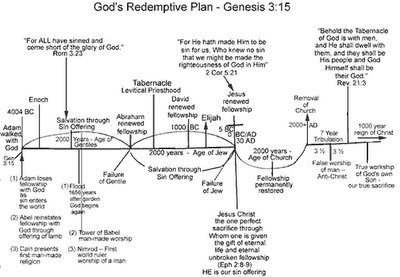
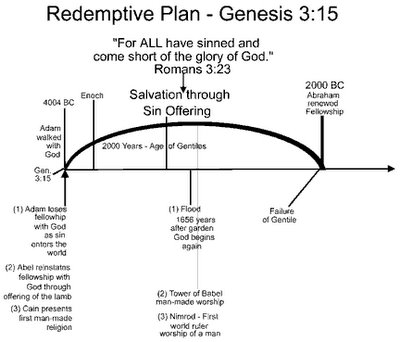
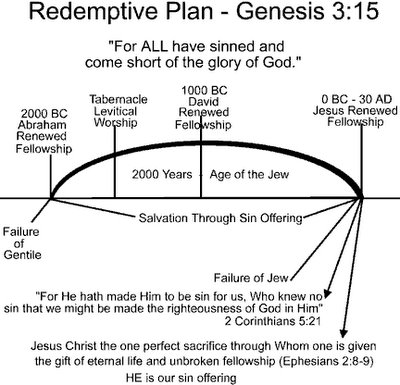
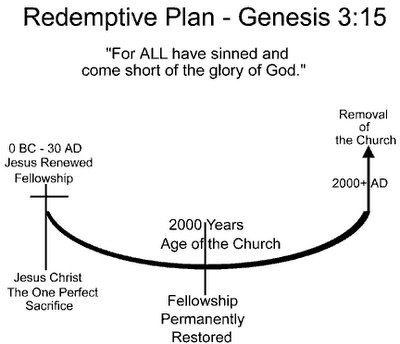
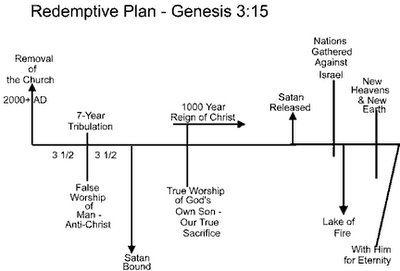
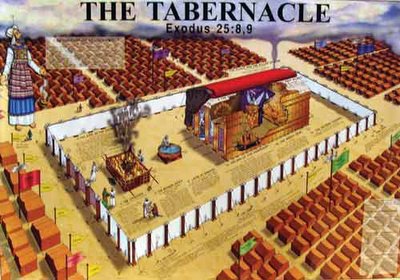
THE WAGES OF SIN IS DEATH
In the Garden of Eden, God told Adam that if he ate from the tree of the knowledge of good and evil, he would die. (Genesis 2:17). God set down His rules and Adam disobeyed. When Adam ate from the tree, God had to follow through with His punishment.
Suppose a teacher has a rule that anyone who cheats on a test, receives an automatic failing grade. All students know the consequence of cheating on the test. Therefore, when someone cheats, they can expect a failing grade. If the teacher doesn't follow through with those consequences, the teacher compromises his position. A teacher who doesn't do what he says, cannot be trusted.
If God didn't follow through with His punishment, God would be compromising His nature, and we could no longer believe or trust Him. God set up the rules, and the rules stated that if Adam sinned, he would die. All of Adam's descendants are sinful and unholy (Isaiah 59:3; Romans 3:23) and cannot be in the presence of the Holy God unless that unholiness is taken away. Therefore, all people need to atone for the sin in order to approach God or they will die. (Leviticus 16:1-2; Hebrews 10:26-31)
WHY BLOOD?
Death was the punishment God laid out to Adam, and God mercifully allowed an animal to temporarily take the place of the sinner. (Genesis 4:3-7; Leviticus 1) The blood of this animal sacrifice atoned, or took away, sin (Leviticus 17:11), making it possible for the worshipper to enter into God's presence. (Leviticus 16:16) Ultimately, the blood of Jesus Christ atones, or takes away, one's sins once and for all. (Hebrews 10:10)
WHY A TEMPLE or A TABERNACLE?
David desired to build a "house of rest for the ark of the covenant" and for the "footstool of God." (1 Chronicles 18:2) What David meant was he wanted to create a place where God could meet with His people.
Solomon's Temple was a place where the people would come and offer sacrifices of atonement in order to meet with God.
At the Temple's dedication, Solomon humbly said that even the heavens could not contain God, let alone the Temple he had built. (1 Kings 2:27)
Solomon let the people know that God had not been, was not currently, and would never be confined to any physical structure on earth.
Solomon declared that the God of Israel is omnipresent (everywhere) and transcendent (above all creation) and this reminded the people that God is unlike the pagan gods, and the Temple is also unlike the pagan temples.
For pagans, their temple contained an idol and was the place where their god lived. This was not the case for Solomon's Temple. God does not live in a temple made with hands. (1 Corinthians 6:19)
The "footstool of God" (1 Chronicles 28:2) was a place for people to meet and worship God once they had made atonement for their sins. (Psalm 132:7)
SACRIFICE (see # 1 below)

For all sacrifices, including the sacrifices made on the Day of Atonement, goats, doves, bulls and lambs were killed and their life blood was drained. God said that the life of a creature is in the blood and that the blood makes an atonement for one's life. (Leviticus 17:11) The blood was collected and sprinkled upon the horns of the altar and upon its base. (Leviticus 4)
The meat was the food for the priests and for the family offering the sacrifice. Just the fat and the entrails were burned.
The English the verb "sacrifice" means something entirely different from what it means in Hebrew:
The Hebrew word for "sacrifice" (korban) is from the same root as "to come near, to approach, to become closely involved in a relationship with someone." No word in the English language can adequately render the idea behind the Hebrew word “korban”.
If the definition of the korban is "to come closer," then the goal of the sacrifice is the aim of bringing the person doing the offering closer to the Creator and the source of all life. The sacrifice is not an idea of giving something up or losing something of value; it strives for nearness to God. For as King David prayed in the book of Psalms (73:28), "But as for me, how good it is to be near God!" In a sense, what happens to the offering is also taking place within the heart and mind of he who brings it.
This is part of the concept of the Temple sacrifices as well. For when an individual sinned and brought a korban, the death and burning of the animal on the Temple altar gave him a strong visual symbolization of what he himself deserves, were God to judge him severely, with the exacting scrutiny of unmitigated justice. Throughout the book of Leviticus, in reference to the offerings, God never refers to Himself with the Name “Elohim”, which denotes the Divine attribute of strict justice. For when connected to the sacrifices this could be misconstrued to indicate that the God who commands these offerings does so as a vengeful, bloodthirsty deity who demands a sacrifice as reparation. The only Name that the Bible associates with the offerings to God is HaShem, YHVH - signaling the attribute of Divine love and mercy.
The Sacrifices are Meaningless Without Repentance.
It was only in the Temple that the full spiritual nature of this process could be appreciated. The sacrifices did not serve as an end in themselves. For example, the sin offering, which was a minority of all the offerings brought in the Temple, was powerless to atone for sin unless it was accompanied by a thought of resolute, true repentance. Without repentance, the sacrifice was invalid; the korban itself was only a means by which man could arouse himself to repent. God would prefer that man not sin, and not be necessitated to bring any offering.
If these sacrifices in the past actually atoned for the people’s sins, then they would be equally blasphemous in light of Christ's perfect sacrifice. Hebrews 10:4 tells us, "…it is not possible for the blood of bulls and goats to take away sins." Furthermore, there would have been no need for Christ's once and for all atoning sacrifice if these past acts did the job.
Isaiah 1:11-20 - "I am sick of your sacrifices," says the LORD. "Don't bring me any more burnt offerings! I don't want the fat from your rams or other animals. I don't want to see the blood from your offerings of bulls and rams and goats. Why do you keep parading through my courts with your worthless sacrifices? … I cannot stand the sight of them! From now on, when you lift up your hands in prayer, I will refuse to look. Even though you offer many prayers, I will not listen. For your hands are covered with the blood of your innocent victims. Wash yourselves and be clean! Let me no longer see your evil deeds. Give up your wicked ways … "No matter how deep the stain of your sins, I can remove it. I can make you as clean as freshly fallen snow. Even if you are stained as red as crimson, I can make you as white as wool. If you will only obey me and let me help you, then you will have plenty to eat. But if you keep turning away and refusing to listen, you will be destroyed by your enemies. I, the LORD, have spoken!"
Hebrews 9:11-14 - So Christ has now become the High Priest over all the good things that have come. He has entered that great, perfect sanctuary in heaven, not made by human hands and not part of this created world. Once for all time he took blood into that Most Holy Place, but not the blood of goats and calves. He took his own blood, and with it he secured our salvation forever. Under the old system, the blood of goats and bulls and the ashes of a young cow could cleanse people's bodies from ritual defilement. Just think how much more the blood of Christ will purify our hearts from deeds that lead to death so that we can worship the living God. For by the power of the eternal Spirit, Christ offered himself to God as a perfect sacrifice for our sins.
THE SCAPEGOAT (see # 2 above)
Once a year, on the Day of Atonement, the High Priest was to lay both hands on the head of the live goat and confess over it all the wickedness and rebellion of the people and the goat would carry on itself all their sins. (Leviticus 16:18-22) In this case, the "scapegoat" carried their sins out to the desert and was released. Several other sacrifices were made on the Day of Atonement.
THE MOST HOLY PLACE (see # 3 above)
On the Day of Atonement, the High Priest also entered the Most Holy Place (Holy of Holies). He brought the blood from the sacrifice which atoned for a repentant people and then placed (sprinkled) the blood upon the throne of God, the "mercy seat", between the two cherubim. (Exodus 25:22)
The Bible speaks of Jesus Christ as a sacrifice for us. (Ephesians 5:21) We hear quite a bit about the blood of Jesus, and sometimes this is tied in with the idea that Jesus was suffering a punishment from God for our sins. Some people think of sacrifice as a way of escaping God's punishment by letting it fall symbolically upon a sacrificial animal. This same idea is applied by some to Jesus Christ as One who took on Himself God's penalty for all our sins, and so reconciled God to us by satisfying God's "justice". The idea that Christ was punished, however, is not actually taught in the Bible, although He was in a symbolic sense a sacrifice.
Sacrifice is actually a symbol of holiness rather than punishment. God is loving and merciful, and has no desire to see either human or animal suffering. When we sin, we are not reconciled to God through punishment, but by repenting and living a good life. The sacrifice is then a symbol of our desire to repent and dedicate our life to God. Christ was symbolically a sacrifice because He purified and sanctified Himself by His holy life. He is symbolically our sacrifice because He enables us to life a holy life.
How Is Christ Our Atonement?
"Atonement" has no connection with punishment. It comes from "at-one-ment" and simply means "making one" or "reconciliation." In fact, "atonement" and "reconciliation" are the same word in the Greek. We might ask, Who was reconciled - God or the human race? The Bible's answer is the human race. "God was in Christ, reconciling the world to Himself." (2 Corinthians 5:19) We receive "at-one-ment", never God. "We were reconciled to God by the death of His Son.... We have received atonement" (Romans 5:10-11)
Romans 12:1 – “And so, dear brothers and sisters, I plead with you to give your bodies to God. Let them be a living and holy sacrifice--the kind he will accept. When you think of what he has done for you, is this too much to ask?”
REFLECTING ON ATONEMENT
1. What happens to people if they don't atone for their sin? (Romans 6:23)
2. How did Israel atone for their sins? (Leviticus 17:1)
3. Who atones for sins now? (Hebrews 9:11-14; 10:10)
4. Why did David want to build the Temple? (1 Chronicles 28:2)
5. What is the scapegoat and what did it symbolize? (Leviticus 16:18-22)
6. What does it mean to be a “living sacrifice”? (Romans 12:1)


